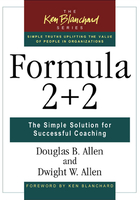

FOREWORD BY KEN BLANCHARD
I am thrilled to have Dwight and Doug Allen’s book, Formula 2+2: The Simple Solution for Successful Coaching, as part of my Berrett-Koehler series. The authors are two of the brightest people I have ever met, and they’re bringing new insights and creativity to an area that badly needs help: performance feedback.
So often when I ask people, “How do you know whether you’re doing a good job?” they tell me, “I haven’t been chewed out lately by my boss.” In other words, no news is good news. Too many managers are “seagull” managers. They’re not around until there’s something wrong; then they fly in, make a lot of noise, dump on everybody, and fly out. All too often, feedback from managers focuses on the negative.
In this marvelous book, Doug and Dwight Allen rightfully contend that many people think performance feedback is “about as much fun as a trip to the dentist.” They suggest there is a better way. Their 2+2 system is an ongoing coaching and feedback process that can supplement and humanize feedback strategy and make it more effective for any manager.
With the 2+2 process, when managers or leaders meet with a member of their team, they share at least two compliments—two positive behaviors they’ve noticed the person doing that deserve to be recognized. This is a formula for success because when people feel appreciated, they drop their defenses and become willing to listen to feedback. Then the manager or leader makes two suggestions—ideas that might help the person improve. As a result of this process, there is a wonderful balance in the kind of feedback people receive.
Dwight Allen has been a seminal thinker in human development for many years. I first met him in the late 1960s at Ohio University in Athens, Ohio, where I went—straight out of graduate school at Cornell University—for my first teaching opportunity. Dwight was on campus to give a public lecture to people interested in education. After he was introduced, he pulled a hundred-dollar bill out of his pocket, held it up, and said, “I’ll give this hundred-dollar bill to anyone in this audience who can name for me the capitals of North and South Dakota and North and South Carolina.”
No one in the audience could name all the capitals. Dwight laughed and said, “How many of you had to take a capitals test when you were in school?” A knowing smile came across everyone’s face. Then Dwight said, “I once caught a teacher giving a capitals test to her class. When I asked why she didn’t put atlases around the room during the test so the kids could look up the answers, she said, ‘I can’t do that; all the kids would get them right.’”
Dwight laughed again and said, “What is education? A zero-sum game? Some win and some lose? Somebody once asked Einstein what his telephone number was and he went to a phone book. An intelligent person knows how to find information, not store it.”
With that introduction, Dwight completely captured my imagination. I had always felt that performance evaluation was a problem in organizations. Most of the focus was put on sorting people out and making sure that not too many people won. That really bothered me. Dwight’s thinking unleashed all kinds of options when it came to managing people’s performance.
By the time Dwight concluded his lecture with his big-picture dream and vision for education, he had me hooked. It wasn’t even a year later that Margie and I followed him to Amherst, Massachusetts, where Dwight had taken over as dean of the School of Education. We wanted to “chase his windmill.” Dwight felt we could get better results in education by random chance than by doing what we were doing. He eliminated all the courses that were being taught and we started over from scratch. When I arrived, I taught Experimental Classes 155, 156, and 157. As I look back, those years were the most exciting I have ever had in education.
During my years at Amherst I also met Doug Allen. I was delighted to reconnect with him a few years ago. As you’ll see in these pages, Doug is as creative a thinker as his dad.
Read this book. Practice the concepts presented. I guarantee it will make a difference in the way your organization operates. The 2+2 feedback and coaching system will help you develop enthusiastic people to better serve your customers and contribute greatness to your organization.